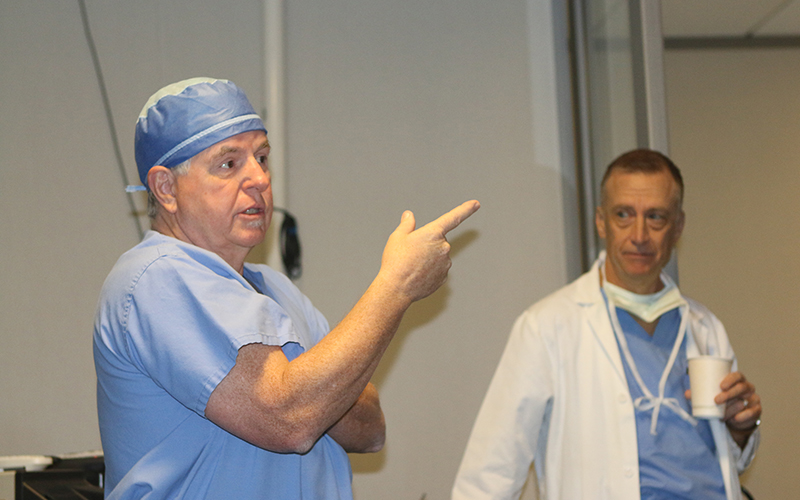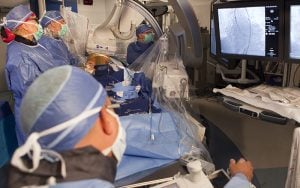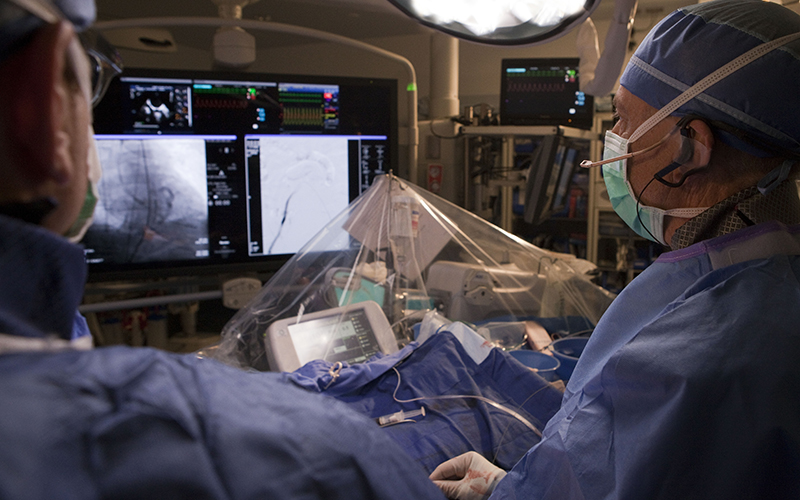
Interventional cardiologist, Dr. Timothy Byrne, and cardiac surgeon, Dr. Michael Caskey introduce the transcatheter aortic valve replacement, a revolutionary new technology for heart surgery. (Photo by Isabel Menzel/Cronkite News)
PHOENIX — A relatively new heart surgery procedure radically lowers the recovery time for patients and may help save lives, according to medical experts who are training physicians in Arizona on the method.
Clinical trials show patients undergoing heart-valve replacement surgery spend an average of two to three days in a hospital, compared to a minimum of one to two weeks for patients undergoing open-heart surgery.
The team of cardiac surgeons and cardiologists demonstrated the procedure on two patients at Abrazo Arizona Heart Hospital. The hospital was one of 80 sites participating in the trials that aim to demonstrate the effectiveness and durability of the procedure known as a transcatheter aortic valve replacement, or TAVR.

A team of cardiologists and cardiac surgeons look into the monitor while performing heart surgery. (Photo by Brian Thorsen/TAVR Abrazo Arizona Heart Hospital)
More than 40 doctors from around the country watched on video monitors, as a team of surgeons inserted a catheter into a patient’s groin, thread it into an artery and into the heart, where an artificial valve is placed. The surgery is described as minimally invasive compared to open heart surgery that involves cracking open a patient’s sternum.
Early results are promising, said Dr. Timothy Byrne, a cardiologist and lead surgeon for the Arizona demonstration.
“Is the transcatheter valve going to replace traditional surgery? Well, the data will tell us,” Byrne said. “We believe that all the way down the road that the answer is ‘yes.’ ”
The surgery is for patients suffering from a blockage or narrowing of an aortic valve leading to aortic stenosis, which restricts blood flow to the brain. An estimated 1.5 million Americans have the progressive, life-threatening condition.
Clinical trials for the surgery, have involved high-risk heart patients who are in a frail state and aren’t good candidates for open heart surgery, but trials are being conducted to determine if the surgery is a better option for low-risk patients as well.

Cardiologist Timothy Byrne and his team perform the transcatheter aortic valve replacement procedure. (Photo by Brian Thorsen/TAVR Abrazo Arizona Heart Hospital)
Not all patients are good candidates for the procedure. The surgery is less likely to be performed on people with severe or advanced dementia and severe lung disease. The durability of the replacement valve is still unknown, said Tammy Querrey, a director of cardiovascular care at Abrazo.
The first patient who received an aortic valve in 2005 in Venezuela is alive and healthy, Byrne said.
The recovery time is shorter and less stressful for patients than traditional open heart surgery.
According to medical experts, heart-valve patients typically spend an average of two to three days in the hospital with an overall recovery of only a few days. In comparison, open-heart surgery patients spend one to two weeks or longer in the hospital, with a total recovery time of six weeks. Less than 30 percent of patients continue to use their pacemakers six months after the heart-valve surgery.

Cardiologist Timothy Byrne and his team look into the monitor while feeding a catheter into the heart chamber. (Photo by Brian Thorsen/TAVR Abrazo Arizona Heart Hospital)
Byrne said valve-replacement patients had a lower mortality rate and less strokes than open-heart surgery patients.
Surgeons believe the procedure will ultimately prove to be more efficient and less risky than traditional surgery. And, it will return quality of life.
So far, the procedure has had excellent outcomes and changed the lives of thousands, including a 95-year-old patient.
“It’s very inspiring when they say, ‘Well, I want to get back on the golf course, or I want to get back to walking around this pond,'” Querrey said. “‘I just want to be able to walk a couple times a day around the pond that I like to see the ducks, the birds, the nature, just experience that simple thing again.'”
Now he is able to do all of that three times a day.